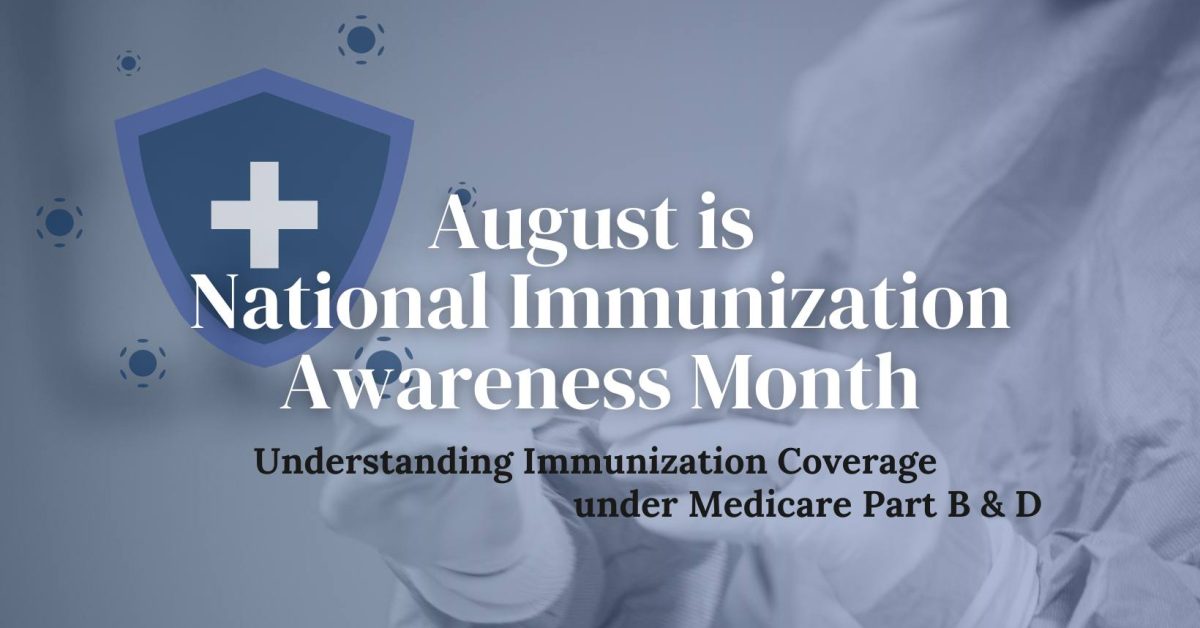Understanding Immunization Coverage under Medicare Part B & D
August marks National Immunization Awareness Month (NIAM), an annual observance to emphasize the importance of vaccinations for individuals of all ages. For Medicare beneficiaries, immunizations play a crucial role in maintaining health and preventing serious diseases.
The Importance of Immunizations
Immunizations are one of the most effective ways to protect against infectious diseases. Vaccines work by stimulating the immune system to recognize and combat pathogens, such as viruses and bacteria. For older adults, the risk of complications from illnesses like the flu or pneumonia increases due to the natural weakening of the immune system with age. Vaccinations help reduce this risk and can prevent serious health issues.
Key Vaccines Covered by Medicare Part B
As we age, certain vaccines become especially important. Here’s a closer look at the key immunizations recommended for older adults Medicare Part B covers as part of its preventive care benefits.
- Flu vaccine: Annual vaccine given in one shot before or during flu season, usually November through April
- COVID-19 vaccine1 : Exact frequency and timing under review, but recommended to get one dose of updated vaccine
- Pneumonia vaccine: One-time vaccine given in two shots at least one year apart
- Hepatitis B vaccine: One-time vaccine given in two to four shots over one to six months for people who are medium to high risk, including people with diabetes.
Vaccines covered by Medicare Part D
Medicare Part D covers all commercially available vaccines needed to prevent illness. You can get Part D coverage through a stand-alone Medicare prescription drug plan (Part D) or a Medicare Advantage plan (Part C) that includes drug coverage.
Part D covered vaccines include the following:
- RSV vaccine (Respiratory syncytial virus): One-time vaccine given in one shot
- Shingles vaccine: One-time vaccine given in two shots over two to six months
- Tdap vaccine (tetanus, diphtheria and pertussis/whooping cough): One shot if you’ve never been vaccinated, and a booster every ten years
- Other vaccines covered: Vaccines that are “reasonable and necessary” to prevent illness and are not covered by Part B
Costs of Vaccines and When They Are Not Covered
With Medicare, you don’t have to pay out-of-pocket for vaccines covered under Part B, including flu, pneumonia, and Hepatitis B, provided that your healthcare provider accepts Medicare.
For vaccines recommended by the Advisory Committee on Immunization Practices (ACIP), there is no cost if you have Part D coverage. However, the cost for other vaccines covered by Part D can vary based on your specific plan and provider.
Additionally, the location where you receive your vaccine can impact your expenses. Getting vaccinated at a pharmacy might result in lower costs compared to receiving the vaccine in a doctor’s office.
How to Access Vaccinations
With Medicare Part B and Part D covering many essential vaccines seniors are recommended to have, it’s important to know the different ways you can access these immunizations.
- Consult Your Doctor: Schedule an appointment with your healthcare provider to discuss which vaccines you need. Your doctor can provide personalized recommendations based on your health history and current condition.
- Visit a Pharmacy: Many pharmacies offer vaccines and can bill Medicare directly. This can be a convenient option if you prefer not to wait for a doctor’s appointment.
- Community Health Clinics: Local health clinics often provide vaccination services, which can be especially useful if you have limited mobility or transportation options. Check with your local health department for more information.
Staying Informed and Protected
Keeping up with immunizations is a simple and effective way to stay healthy and avoid serious illnesses. During National Immunization Awareness Month, take the time to review your vaccination history and schedule any needed shots. Here are a few tips to help you stay informed and protected:
- Keep a Vaccination Record: Maintain an up-to-date record of your vaccinations. This can help your healthcare provider track your immunization status and ensure you receive timely booster shots.
- Stay Current on Health Guidelines: Health recommendations can change, so it’s important to stay informed about the latest guidelines from reputable sources like the CDC and your healthcare provider.
- Educate Yourself and Others: Understanding the benefits of vaccines and sharing accurate information with friends and family can help promote community health.
Vaccinations are a critical component of preventive healthcare for older adults. By staying current with recommended immunizations, and utilizing your preventative care visits, you can protect yourself from potentially serious diseases and enjoy a healthier, more active life.
For more information, visit the CDC’s vaccination page or speak with your healthcare provider.
If you’d like more assistance in understanding immunizations covered in your current Medicare health coverage benefits, please contact our office today.
Stay informed, stay protected, and stay healthy!

